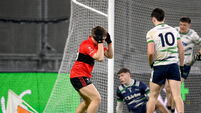‘I don’t like being called a defensive wing-forward’

His timing wasn’t great, Donnchadh Walsh acknowledges.
The Kerry wing-forward started a three-year course in physiotherapy the week after the Kingdom lost to Dublin, in 2011: “I was up there to take all the hits.”














